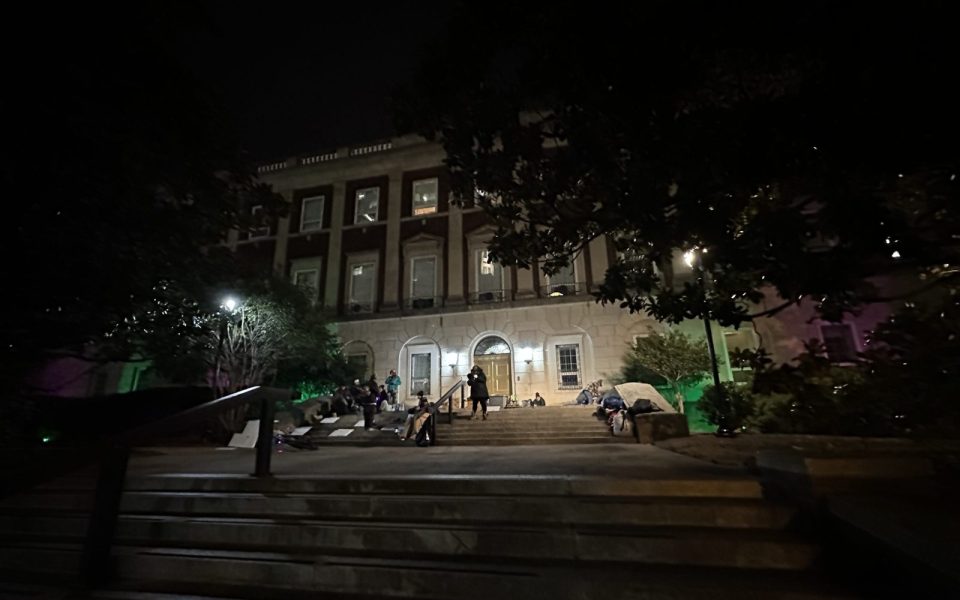Featured photo: In February, Winston-Salem’s unhoused residents and local activists slept outside city hall to demand action from city leaders. (Photo by Gale Melcher)
Many Triad residents leaving work at the end of the day have a home to wake up in the next morning.
But some residents have to worry about where they’re going to lay their head, how much they’re going to sleep and if they’ll survive the night.
Since 1999, nearly 600 people have been killed simply for being unhoused, according to the National Coalition for the Homeless. Stress combined with lack of sleep can make it particularly hard to focus and attend to basic needs that people with housing often take for granted.
To alleviate the housing crisis, Winston-Salem leaders are working toward becoming the next city in North Carolina to offer temporary housing to people facing homelessness. Following in the footsteps of cities such as Greensboro and High Point that bought Pallet homes, 64-square-foot aluminum units that offer two people a place to sleep each, Winston-Salem seeks to purchase similar structures, but from a different company — and at a different price point. These units are collapsible micro shelters created by Foldum Corp.
The city is looking into buying 10-15 of the company’s micro shelters, which start at $10,000 and 156 square feet — around twice the size of the Greensboro Pallet shelters and nearly $8,000 cheaper. Add-ons such as bathrooms and mini-kitchens are also available with Foldum’s micro shelters. Greensboro bought 30 Pallet shelters in 2022 for $535,014 for the Doorway Project, a city-funded program that gives people a place to sleep during the cold winter months. Case managers help residents look for permanent housing during their stay.

Winston-Salem is looking into shelter designs that can house two people with a wall separating their rooms for privacy.
Shereka Floyd, the city’s Housing Programs manager with the Neighborhood Services Department, says that the units haven’t been bought yet, but that they are currently working to locate two city-owned lots that will be “suitable for the project scope” once an engineer assesses the “feasibility of the possible lots and locations.”
The units are portable and can be easily set up, and can collapse all the way down to a height of 18 inches.
Having stable housing gives people the opportunity to get back on their feet without having to worry about where they’re going to lay their head at night.

A 2000 study that gave people access to housing showed that after years, 88 percent of program participants remained housed.
In Denver, CO, a study showed that after two years, participants had an average of eight more office-based visits for psychiatric diagnoses, three more prescription medications and six fewer emergency department visits than the control group.
While the shelters wouldn’t be permanent housing, 80 percent of Doorway Project residents in 2022-23 were able to “move into some other type of shelter or housing by the end of the program,” according to the IRC’s Executive Director Kristina Singleton. Seventy-five people resided in the shelters that year.
Back in March, Mayor Pro Tempore Denise D. Adams said that the city needs to “get out of the box” when it comes to housing.
“What is it that people need right now where they are?” she asked. “It’s not always going to be a “brick and mortar building.”
Due to limited shelter space, many homeless people have to stay in the estimated 270 encampments that exist around the city.
But with the Supreme Court’s recent June decision to penalize those who sleep or camp in public spaces such as sidewalks, streets and city parks, homeless people are being put at even greater risk. Some state leaders, such as California’s Gov. Gavin Newsom, have already given orders to state agencies to start clearing encampments.
Councilmember Robert C. Clark said that people often call him saying things like, “Why don’t you shut down the encampments?”
“Where do you want them to go?” Clark responded.
All CityBeat reporting content is made possible by a grant from the NC Local News Lab Fund, available to republish for free by any news outlet who cares to use it. Learn More ↗
Republish this storyJoin the First Amendment Society, a membership that goes directly to funding TCB‘s newsroom.
We believe that reporting can save the world.
The TCB First Amendment Society recognizes the vital role of a free, unfettered press with a bundling of local experiences designed to build community, and unique engagements with our newsroom that will help you understand, and shape, local journalism’s critical role in uplifting the people in our cities.
All revenue goes directly into the newsroom as reporters’ salaries and freelance commissions.


In 25 years, only 600 people have died from homelessness?
Not exactly.
The stat comes from this page
https://nationalhomeless.org/tag/hate-crimes/
It describes the number of homeless people who have been murdered in hate crimes. Truly many, many more have died simply frmo the effects of living on the street,
I appreciate the city trying to help the homeless. No one wakes up and decides today they will be homeless.
Hopefully the city can find a suitable lot for this endeavor. Consider a area for bathing, and a community kitchen
where they can cook meals. Other states have done this and it works!